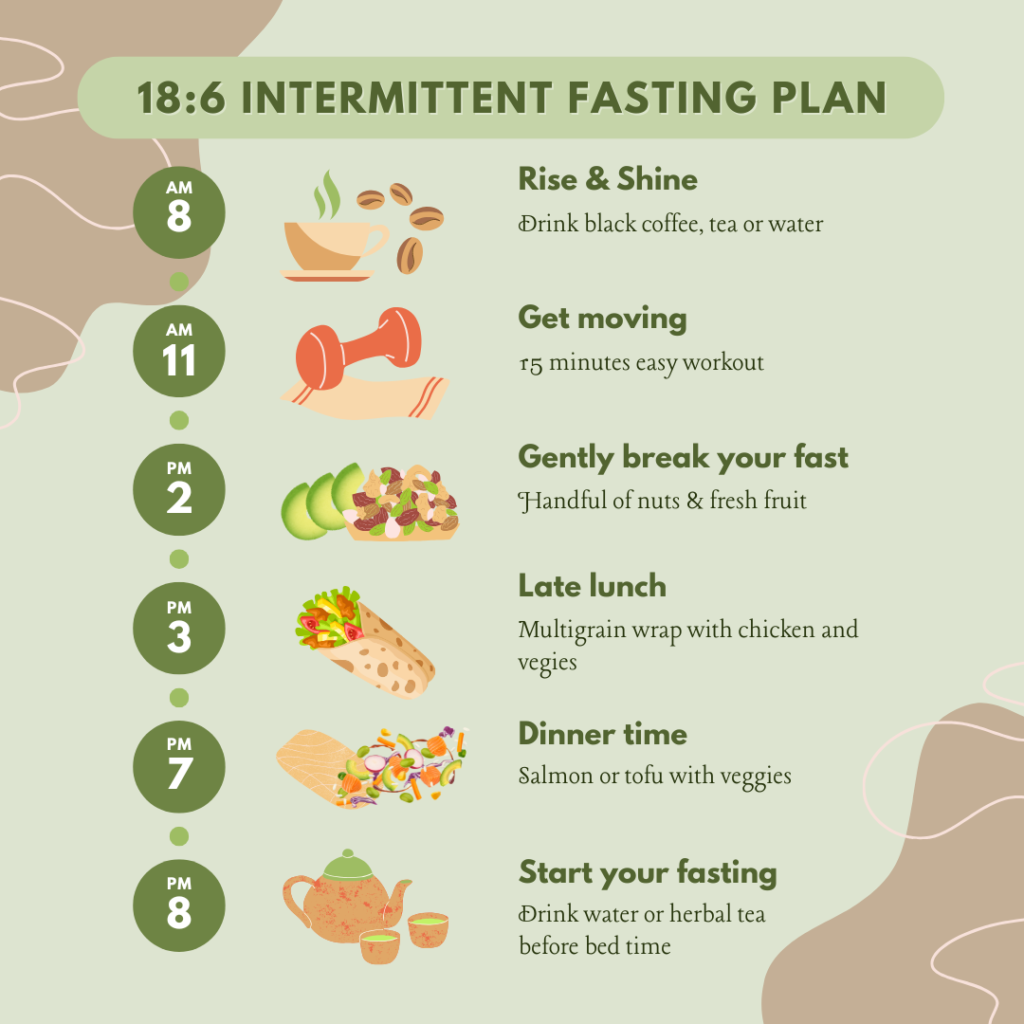
Table of Contents
In the health and wellness world, intermittent fasting (IF) has gained remarkable popularity. You’ve likely seen influencers posting their fasting schedules or friends flexing about its benefits. It has also been the Best way to lose weight .But does intermittent fasting work for everyone? Let’s explore the science, benefits, potential difficulties, and who might or might not grow with this eating pattern.
What is Intermittent Fasting?
Intermittent fasting isn’t about what you eat but when you eat. It is a pattern that alternates between periods of eating and fasting. While fasting is a practice rooted in history and culture, modern Intermittent Fasting is often used for its potential health benefits.
Popular Methods of Intermittent Fasting:
- 16/8 Method: You must Fast for 16 hours and eat within an 8-hour window (e.g., noon to 8 p.m.).
- 5:2 Diet: Eat normally for five days a week and significantly restrict calories (500-600) on two non-consecutive days.
- Eat-Stop-Eat method: Incorporate a full 24-hour fast once or twice a week.
- Alternate-Day Fasting: Fast every other day, either fully or with minimal calorie intake.
- Warrior Diet: Fast for 20 hours and eat one large meal at night.This is hence the most difficult method of Fasting.
The Science Behind Intermittent Fasting
Intermittent fasting influences your body on a cellular and hormonal level:
- Hormone Regulation: Being on a Fast lowers insulin levels, helping fat cells release stored energy. It also increases human growth hormone (HGH), which can boost metabolism.
- Cell reset: During fasting, your body initiates autophagy, a “cellular cleanup” process that removes damaged cells from the body and potentially reduces the risk of chronic diseases .More or less, it acts as a Detox for the body.
- Weight Management: By limiting eating windows, people often consume fewer calories, which results in weight loss and hence it is known as one of the best methods to lose weight.
- Brain Health: Some studies suggest that Intermittent Fasting may improve brain function and protect against neuro breakdown diseases like Alzheimer’s.
Benefits of Intermittent Fasting
For many, the appeal of intermittent fasting lies in its simplicity and adaptability. Here are the most notable benefits:
- Weight Loss and Fat Reduction:
- By reducing calorie intake and increasing metabolism, Intermittent fasting often results in effective weight management.
- Real-life example: Deepti, a busy mom, found that the 16/8 method helped her shed 10 pounds in three months without precisely tracking calories.
- Improved Insulin Sensitivity:
- Lowers insulin levels during fasting can enhance insulin sensitivity, benefiting those with prediabetes or type 2 diabetes.
- Heart Health:
- Fasting may improve markers like blood pressure, cholesterol levels, and triglycerides.
- Mental Clarity and Energy:
- Many people report sharper focus during fasting periods. This is linked to ketones, an energy source produced during fasting.
- Flexibility and Simplicity:
- No need for strict meal plans or calorie counting—just an eating schedule.
Who benefits with Intermittent Fasting?
While intermittent fasting offers many benefits, it’s not a one-size-fits-all solution. Here’s a breakdown of who might benefit most by the particular fasting:
1. Busy Professionals:
- Fasting eliminates the need to prepare breakfast, saving time in the morning.
- Example: Mohit, a businessman, used the 16/8 method to make his mornings productive and simpler and maintain energy for work.
2. People with Insulin Resistance:
- Fasting’s effects on insulin can help regulate blood sugar levels.
3. Those Seeking Simplicity:
- For people overwhelmed by detailed diets, IF provides an easy-to-follow structure.
4. Athletes and Fitness Enthusiasts:
- Some athletes use fasting to improve fat burning and metabolic flexibility. However, timing workouts around eating windows is crucial.
Who Should Be Cautious or Avoid Intermittent Fasting?
Intermittent fasting isn’t suitable for everyone. It’s essential to consider individual health, lifestyle, and goals.
1. People with a History of Eating Disorders:
- Fasting may trigger disordered eating patterns, where you stop eating at such a point and you are not hungry for hours too.
2. Pregnant or Breastfeeding Women:
- These groups need steady nutrient intake to support their baby’s growth and their own health.
3. Individuals with Certain Medical Conditions:
- People with diabetes, low blood pressure, or those taking medications should consult a healthcare provider before trying IF.
4. Highly Active Individuals:
- Endurance athletes or those with demanding training schedules might struggle to meet caloric needs within restricted eating windows.
5. Those Who Struggle with Routine:
- If your lifestyle involves irregular schedules or social commitments, fasting windows might be challenging to maintain.
Tips for Starting Intermittent Fasting
If you’re curious about intermittent fasting, here’s how to start:
- Choose a Method That Fits Your Lifestyle:
- Start with the 16/8 method, as it’s the most beginner-friendly.Do not compete with anyone while fasting ,everybody has its own way of coping with the changes around.
- Stay Hydrated:
- Water, herbal teas, and black coffee or tea are essential during fasting periods.The herbal tea or green tea also help you in good digestion.
- Ease Into It:
- Gradually extend fasting windows to allow your body to adapt.Remember! No competition .
- Focus on Nutrient-Dense Foods:
- During eating windows, prioritize whole, unprocessed foods rich in fiber, protein, and healthy fats.
- Listen to Your Body:
- If you feel dizzy, weak, or unwell, it’s okay to adjust or stop fasting.Take rest and don’t let your body make it a burden on yourself.
Common Myths About Intermittent Fasting
- “Skipping Breakfast is Unhealthy”:
- While breakfast is the “most important meal” for some of us because to start our day we need a nutritious meal, skipping it can work well within a fasting plan without negative effects.
- “You’ll Lose Muscle”:
- Proper protein intake during eating windows and strength training can preserve muscle mass.
- “Fasting Equals Starvation”:
- Fasting is a controlled practice and vastly different from long starvation.
The Conclusion: Does It Work for Everyone?
Intermittent fasting can be a powerful way for improving health and managing weight. However, its success depends on individual preferences, goals, and situations you deal with. While some live on a structured fasting routine, others may find it unsustainable or unproductive to live on.
Ultimately, the best eating pattern is the one you can maintain for a long-term and aligns with your health needs. If you’re considering intermittent fasting, consult a healthcare provider or nutritionist to ensure it’s a good fit for you.
Call-to-Action
Have you tried intermittent fasting? Share your experiences in the comments below! If you’re looking for more tips on living a balanced, healthy lifestyle, explore our other articles at FitYouFitMe.com. Let’s find what works best for you!
